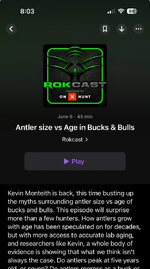Any actual studies (or opinions)? I'm a bit torn between these two schools of thought....
On the one hand, hunters are killing the bucks with the largest antlers. Example would be an average hunter comes across a couple of 3-year old bucks, one having a 3-point frame and the other having a larger 4-point frame. Almost all will shoot the larger 3-year old deer. When the rut comes along the older bucks that survive will breed multiple does. I've heard people say that you can't shoot the genetics out of a herd because the does contribute 50%. But... if that mature 3-point is breeding 5-10 does a season he is a much larger contributor to the herd. Multiply this scenario thousands of times per hunting season, and a generation every year and one would think antler genetics would be on a decreasing trend.
On the other hand, I've read studies that the health of the buck (in the womb, as a fawn, and during the antler growing season) is a larger contributor to antler size than genetics. If this is the case, then I would lean towards the notion that hunters are not affecting antler genetics to a large degree.
On the one hand, hunters are killing the bucks with the largest antlers. Example would be an average hunter comes across a couple of 3-year old bucks, one having a 3-point frame and the other having a larger 4-point frame. Almost all will shoot the larger 3-year old deer. When the rut comes along the older bucks that survive will breed multiple does. I've heard people say that you can't shoot the genetics out of a herd because the does contribute 50%. But... if that mature 3-point is breeding 5-10 does a season he is a much larger contributor to the herd. Multiply this scenario thousands of times per hunting season, and a generation every year and one would think antler genetics would be on a decreasing trend.
On the other hand, I've read studies that the health of the buck (in the womb, as a fawn, and during the antler growing season) is a larger contributor to antler size than genetics. If this is the case, then I would lean towards the notion that hunters are not affecting antler genetics to a large degree.

